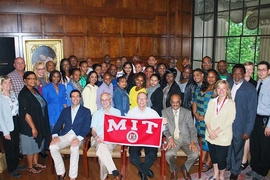In 1949, with millions of people transitioning from military to industrial work, there were few options available for engineers and scientists who needed to refresh and expand their technical knowledge.
In response, MIT became one of the first universities to offer formal programs of professional development classes taught by faculty, with subjects like spectroscopy, food safety, and even digital computing. It was the first step in an ongoing tradition of lifelong learning that has served more than 100,000 attendees from around the world to date and provided Institute faculty with an invaluable line of communication to front-line practitioners in their fields.
Today, the program originally known as the Summer Session has been renamed Short Programs and is celebrating its 65th anniversary as part of a multifaceted set of offerings under the auspices of MIT Professional Education. Going forward, MIT Professional Education is poised for substantial growth with increasing emphasis on reaching wider audiences globally via digital and blended-learning programs.
In the summer of 2014, Short Programs attracted more than 1,000 attendees from some 60 countries to Cambridge to study subjects ranging from nuclear plant safety to additive manufacturing to social data and networks. The same basic education model has endured since 1949: intensive classroom work, lab exercises, and field trips to relevant area facilities where applicable, plus ample time for discussion of the daily challenges faced in industry and government.
Those discussions help the attendees work more effectively, and also benefit the 70-plus MIT faculty members and lecturers who lead the classes.
“Practitioners tell you about the real problems that no one has worked on before, the new problems that didn’t exist when the textbook was written,” explains Richard Larson, professor of Engineering Systems and director of the Center for Engineering Systems, who has taught in the program since 1972 and oversaw it for several years. “When I talk to my undergraduate and graduate students during the academic year, it’s not all hearsay from books and articles, but from talking to people about their life responsibilities.”
Professor Markus Buehler, head of the Department of Civil and Environmental Engineering, calls his MIT Professional Education experience “irreplaceable, because it connects me, on a deep and comprehensive level, with leaders and practitioners in industry. The intense weeks of classroom work and discussion allow me to focus my research and educational activities on high-impact targets that are relevant to urgent real-world needs.”
MIT leadership envisioned this level of connection in 1949, which also saw the launch of the Institute’s research-oriented Industrial Liaison Program. As MIT President Charles M. Vest explained during a 50th anniversary celebration in 1999, both programs were “deeply rooted in the basic values of MIT, and both were designed to help faculty into greater direct contact with senior leaders and decision-makers in industry and government.”
Current President L. Rafael Reif, who taught a 1997 Short Programs class, Multilevel Interconnect Process Technologies for Microelectronic Fabrication, comments, “I know from personal experience that teaching in these programs is richly rewarding for our faculty. And for the Institute as whole, the dividends earned over the past 65 years have been tremendous — we are better connected to the front lines of technology-driven enterprise, and better able to fulfill our mission of disseminating knowledge and effecting positive change.
“Going forward, the experience and skill of the MIT Professional Education team, and their collaborating faculty members, provide a robust foundation for our work in lifelong learning, and a strategic asset for the entire Institute.”
In addition to Short Programs, MIT Professional Education, which was established in 2003 under the School of Engineering, also oversees the Advanced Study Program, which is marking its 50th anniversary of offering industry fellows (currently about 75 per semester) the opportunity to take regular Institute courses on a non-degree basis. More recent additions include Custom Programs, which develops training programs for specific industry or government clients (including Accenture, Novartis, and BP); International Programs, which offers short courses on-site in locales worldwide; and Online X Programs, an initiative launched in 2014 for global digital learning via the edX platform.
MIT Professional Education executive director Bhaskar Pant notes that while there will always be a prominent place for the long-standing on-campus programs, “international and digital learning programs are very much our next frontier, with a focus on addressing global audiences and issues, particularly in emerging economies. There is great hunger for knowledge in these economies, and they’re also places that our faculty and students are keen to understand better.” Early steps in this direction include the recent hosting of a custom course for South African transport managers and a program in Dubai for would-be Middle East entrepreneurs.
As part of the evolution toward wider and more time-efficient access to MIT expertise, says Pant, new education delivery models will be tested. “We’ll be experimenting with digital and with blended learning, which combines online and traditional classroom teaching,” he notes. “A case in point is MIT’s first professional online course, Tackling the Challenges of Big Data, which launched earlier this year and registered nearly 3,500 professionals from more than 80 nations. All put together, this is our way of pursuing the MIT mission statement’s charge to “bring ... knowledge to bear on the world’s great challenges.”








